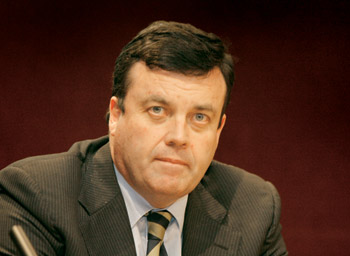More difficult budgets ahead

With the Government set to borrow a further €19 billion this year, further pain can be expected in the December 2010 budget, according to DAN WHITE
26 January 2010
 We were promised a tough budget. The Government wasn’t joking. In what was probably the most severe budget since the 1920s, public sector pay and social welfare rates were slashed as Finance Minister Brian Lenihan sought to cut public spending by a massive €4 billion.
We were promised a tough budget. The Government wasn’t joking. In what was probably the most severe budget since the 1920s, public sector pay and social welfare rates were slashed as Finance Minister Brian Lenihan sought to cut public spending by a massive €4 billion.
The largely passive reaction to the swingeing cuts announced on 9 December shows just how far public opinion has moved over the past year-and-a-half. Remember the uproar which greeted the Government’s plans to deprive the over-70s of their automatic right to a medical card in the October 2008 budget.
If, way back then, Brian Lenihan had dared to announce €4 billion of public spending cuts, he and his cabinet colleagues would have been lynched. Last month Lenihan was able to slay not one but two sacred cows when he announced cuts in both public sector pay and social welfare rates. These would have been unthinkable as recently as 12 months ago.
The willingness of voters to swallow large quantities of necessary but desperately unpleasant fiscal medicine is very encouraging. It shows that, when it comes to the public finances, most people in this country now ‘get it.’
Even before the budget there had been encouraging signs. The mutiny by the Fianna Fáil backbenchers on the Friday before the budget, which forced Taoiseach Brian Cowen to reject the public sector trade unions’ utterly daft proposals for unpaid public sector leave instead of pay cuts, was particularly encouraging.
Encouraging signs at last
Ever since the full extent of the Irish economic and fiscal crisis first became apparent in mid-2008 the political system had been playing catch-up. As the economy tanked, unemployment soared, and the budget deficit ballooned, the Government seemed to be overwhelmed by the sheer scale of the crisis facing it.
Everything the Government has done over the past 18 months, two budgets, the unconditional deposit guarantee, bailing out the banks and the public sector pensions levy, seemed to be a case of too little, too late. By the time the Government could be dragged kicking and screaming to address one issue, the crisis had deepened even further.
As we prepared for the third budget inside 14 months I was initially very pessimistic. Instead of the decisive action that was so desperately required it looked like we were about to be served up another helping of fudge. This suspicion seemed to harden into certainty when Brian Cowen seriously entertained the compulsory unpaid leave plan dreamt up by the public sector trade unions as an alternative to public sector pay cuts.
And then, just when it seemed as if the Government was about to take the soft option yet again, something remarkable happened. An unlikely band of heroes, the Fianna Fáil backbenchers, rose up and told Brian Cowen in no uncertain terms what they thought of the idea of public sector workers taking even longer holidays.
The comparison with the UK, where coincidentally on the very same day as the Irish budget Chancellor Alistair Darling delivered his pre-budget report, could not have been more telling. The UK budget deficit of about 12% of total GDP is at a similar level to Ireland’s. However, while Darling, who faces a general election next May, tip-toed around the deficit, Lenihan bloodily wielded the axe.
The reality was that he didn’t have much choice. With Ireland’s credit rating having been downgraded twice over the past 12 months and the Government needing to borrow at least a further €19 billion in 2010, on top of the €25 billion it borrowed last year, there was no room for half-measures.
Brian Lenihan absolutely had to keep the international bond markets sweet. Anything less than a budget of full-blooded public spending cuts ran the risk of alienating the bond markets and the ECB, upon whom the Government is now totally dependent for the cash it needs to pay its day-to-day running costs.
 Inconceivable
Inconceivable
If the Government had disappointed the bond markets it ran the very real risk of not being able to borrow the money it needs to pay more than 370,000 public servants. Such an outcome was unthinkable. Faced with such an appalling prospect Lenihan had no option but to do what previously had been regarded as inconceivable and cut public sector pay and social welfare rates.
Despite cutting public spending by an unprecedented €4 billion, Lenihan isn’t out of the woods yet. Not by a long shot. He will have to narrow the budget deficit by a further €3 billion in both 2011 and 2012. Last month he gave some hint as to how this might happen. As well as even more spending cuts it is likely to include the introduction of both a property tax and domestic water charges.
The changes in the taxation system that have been pencilled in for 2011, which will include the replacement of PRSI, income and health levies by a combined ‘social charge,’ will almost certainly pave the way for bringing the lower paid, most of whom currently pay little or no tax, back into the tax net.
The rapid growth in government borrowing over the past two years has drastically reduced Brian Lenihan’s room for manoeuvre. This year the cost of servicing the national debt will almost double to €4.6 billion as against “only” €2.6 billion in 2009. This €2 billion increase in debt service costs represents half of the public spending cuts announced in the budget.
When all of these factors are taken into consideration it is difficult to share Brian Lenihan’s confidence that last month’s budget represents the last of the really savage budgets and that we have turned the corner. The best that can be said is that things have stopped getting even worse but that two and possibly three more very difficult budgets still lie ahead.
We’re not out of the woods yet and the road ahead will be a long one with much pain to be endured by all of us. However, after 18 months of unrelieved pessimism maybe we can begin to hope again.



 Print
Print






Fans 0
Followers